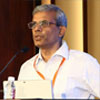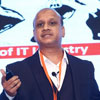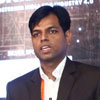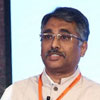ICT Academy is a society and there is no share capital for the Academy. It only runs on income and expenditure. End of the year, thereshould be balance between income and expenditure, since we are anon-profit entity. So, whatever we earn, we give it back to the society,with a single motto of developing the Indian student’s talent.Firstly, the date 24 July 1991 is so special for India; it was on that day,India adopted the new industrial policy. Secondly, the year 2002, whenthe Indian Government and McKinsey came out with a report that only 22 percent of Indian graduates are employable. Thirdly, 7 January 2009, the day the Chairman of Sathyam Computers resigned.
The occurrence of the first event is the opening-up of Indian economy for globalization, i.e. free flow of trade and commerce for India with rest of the world, which means our manpower, should compete with the global workforce. On the second event, McKinsey clearly stated that Indian graduates need to be skilled-up to meet the expectations of global industries, else India will be left behind in global economy by 2020. On the third event, the IT conglomerate melted down and the Indian corporate governance was a big question.
Concurrence to all the three events, ICT Academy started operating in Tamil Nadu in the year 2009. The objective of ICT Academy is to bridge the gap between industry and academia. In this pursuit, there are three key stakeholders, industry, academia and government; ICT Academy pursues leveraging all the three elements to ensure the industry-academia gap is bridged. Having convened 37 editions of Bridge conferences, ICT Academy continues to embark on the journey with intent that is not just confined with India’s development,but with a vision of producing futuristic workforce for the entire world.

K PURUSHOTHAMAN
Chief Executive Officer, K7 Computing
Industry 4.0 is being discussed around the world for the couple of years as an educationist it is our duty to ensure that how we are going to prepare our students for the future. We should not wait for the regulators such as AICTE or UGC to take the initiatives. Rather we need to step ahead in the process of preparing the young talent. I would like to quote the statement of Dr. Norbert Gaus, Executive Vice President for Research and Development for Digitalization and Automation at Siemens who said that “Industry 4.0 is driven by customers and their needs - speed, flexibility, quality, efficiency, and security. A newer trend is building mass customization and this can only be achieved through Industry 4.0. Every single product will get connected, will become intelligent will communicate with other systems” and that manufacturing is transitioning from ‘automated’ towards ‘autonomous systems’.
The nature of jobs is changing. The skill sets of a maintenance worker in an automated factory, for instance is quite different from the skills of a maintenance guy in a conventional plant; more inter-disciplinary skills will be required.
Indian manufacturers say that labour unions appear pretty educated on what’s going on. They are willing to be part of the change. Therefore, we should take this forum as an opportunity for industry and institutions to collaborate and interact and set an agenda to move forward in fostering India for Industry 4.0.

VENKATESH R
Chief Scientist,
TCS Research and Development Centre
I would like to share some of my thoughts on how the curriculum can be integrated to facilitate Industry 4.0 and make the students industryready for future. There is going to be high degree of automation and it will be assisted by high level of machine and artificial intelligence. If we are able to get the students trained on this right now, we can make the students industry-ready.
Gone are the days where we apply our mathematical knowledge or formulas into any issues that we face in the industry. There are no direct solutions to any problems right now, the solutions will be of multiple layer and we will have to train the students to think proactively. This is the limitation our current education system is facing today.
I believe flexibility in curriculum is mandatory. I see uniformity in the curriculum in the education system right now, which has to be changed. With the current ever changing world of technology we are in, there is no point in having same curriculum. Students should be having a wide range to have to choose from. That is what we can enable to leverage the maximum out of Industry 4.0.
INDUSTRY KEYNOTE SESSION I

AMIT GAJWANI
Executive Vice President,
Cybage Software Pvt. Ltd
Data science is transforming businesses. Amazon’s product recommendation is fueled by customer behavior data mainly basket analysis. These recommendations boosted sales by 29%. Coming to YouTube, on an average day, people around the world watch one billion hours of video on YouTube. Most of those 70% are recommended by YouTube’s algorithms. So I can say that, machine learning is driving the revenues of these businesses. More and more revenue can be generated by leveraging machine intelligence.
Most of the decisions we believe that we make with a clear mind, are actually controlled by mental shortcuts known as cognitive biases, causing us to jump to less than optimal outcomes because our brains have evolved to instinctively reduce uncertainty and keep us on the safe path. So, the fundamental impact of data is to remove human biases. We can do it, only if we can analyse the data. We have a platform called ‘Decision Mines’ from Cybage. We use human and machine intelligence to generate value. Decision Mines supports decision makers to make fast decisions, helps to identify business threats and opportunities and it’s aligned with organizations goals. Therefore, Decision Mines makes any organization to realize the decision metrics by translating strategic goals into tactical actions, culture of data driven and consistent decision making and increase the speed of decision making.

SOMNATH GULVE
Director, Software Engineering, Dell EMC
At DELL Technologies, our purpose is to drive human progress through greater access to better technology, for people with big ideas around the world. It is all about foreseeing where the industry is evolving and how we can leverage it.
There was a research which analyzed the creativity of people. The findings projected that the amount of creativity in human being keeps decreasing as we grow older and become more mature. With Machine Learning and AI being the technologies that are dominating currently, we need to train ourselves to be more creative to sustain in this current generation of technologies.
Having an open-minded thought process is very important. In today’s generation it is important to learn to unlearn. With that in our mind,let’s look at Industry 4.0 in a different perspective and let’s make the maximum out of it.

DURGA PRASAD KAKARAPARTHI
Solutions Architect,
Amazon Internet Services
Technologies are evolving at a fast pace. Till now, we have been seeing machine-centric architecture, but now we are moving towards human-centric architecture. At Amazon, we work on consumer-centric architecture and technology, say Recommendation Technology. Whenever customer shops through Amazon website, we use Machine Learning technology to show relevant products to any specific user. In the case of Alexa, Arizona State University has built a campus management solution based on Alexa. When a student or staff interacts with Alexa, it returns with answers to them on topics such as weather, engineering concepts etc. As another case, BYJU’S Learning App uses AWS for delivering audio based educational content on the Amazon Echo Device. On the other hand, we have Amazon Sumerian, which lets anyone create and run Virtual Reality (VR), Augmented Reality (AR), and 3D applications quickly and easily without requiring any special programming or 3D graphics expertise. Sumerian people can build highly immersive and interactive scenes that run on popular hardware. We also have AWS DeepLens. It is the world’s first Deep Learning enabled video camera for developers. AWS DeepLens helps put Deep Learning in the hands of developers, literally, with a fully programmable video camera, tutorials, code, and pre-trained models designed to expand Deep Learning skills.
To enable students on these evolving technologies, AWS Educate, an initiative of Amazon, helps students to get skilled in the trending technologies such as Cloud. With the increasing demand for Cloud experts, AWS Educate provides an academic gateway for the next generation of IT and Cloud professionals. It provides students and educators with the resources needed to accelerate Cloudrelated learning. As an initiative of AWS Educate in association with ICT Academy, ‘Cloud Literacy Month’ is being organized in institutions across India to enable students to learn basic Cloud skills. We also have a program called ‘Cloud Masters’ to empower the faculty of the higher education institutions.

SAURABH GALGALI
Solutions Director,
Oracle India
We always have to face challenges; how we face them makes us ready to emerge successful out of the situation. To handle new sets of challenges, we need new sets of tools. IT industry has evolved a lot in the past 20 years; right now is the age of minimalism, where less is more. Keeping it simple is what works right now. Mobility and user experience are crucial in this age.
There will always be something new; today it is Industry 4.0, tomorrow it will be something else. But as far as we have a stable framework of educating the students and introducing them to new technologies, we will be able to get through any challenge we will be facing with the new technologies.
The main pillars of Industry 4.0 are Cloud, IoT, AI & ML and Blockchain. It is important for us to train our students of this generation in the aforesaid pillars to increase their chances of being hired and also to be good at what they are doing. The way ahead will be to ensure we keep the environment informed on what Industry 4.0 is all about and how we can prepare ourselves for that.
INDUSTRY KEYNOTE SESSION II

BALIRAM MUTAGEKAR
Executive President
HR Infotech Association
Technology keeps changing. If technology remains as it is, then we are not progressing. Earlier, if ten people were working on a project for 1 year, now the same project is executed by five people within six months of time; it proves the necessity to be innovative and evolve fast. As an academician, you should insist your students that instead of learning lots of technologies they should be strong in the fundamentals of the prevailing technologies. They should be able to solve any realtime problem. Make them to learn through many realtime projects. The bottom line is that students should learn to solve problems. If we implement this culture in the institutions, then it’s a huge success. Students are going to work for at least 35 years; to achieve success they should have plans and goals in their career.

MAHESH PARADKAR
Program Director,
IBM
Cybersecurity is a universal challenge, to which, even large corporate fall a prey. The issue is that there are innumerable tools available in the market, but no stable solution.
How IBM deals with Cybersecurity is that we actually built an integrated security immune system. A security breach can be from any source, an IoT device or network or even a mobile device. So end point management is very important. The immune system has to be built around the IT system that we have.
When we are trying to bring subjects related to Cybersecurity, but it will be too much to take in for the students at the UG level. At the early level, it is critical to understand the basics of security; and anything related to Cybersecurity should be more of hands-on practice rather than just theoretical learning. With the immense free open source tools available in the market, students should be able to take up projects in their desired subjects and should explore more in that area. Interacting with people from Industry is also very crucial.

VIKASH DUBEY
Head – Human Resource, Persistent Systems
Over the last few years, the government, industries and the academia are collaborating in making the students ready for Industry 4.0. But this has been happening only in few colleges and not everywhere. Only when this starts happening in all the colleges, there will be a considerable change in the educational system. And this is also an opportunity for the corporate to be involved to make a better industry-ready curriculum.
If this does not happen, it will force the companies to start their own academic program that enables the companies to teach the students what is needed for them. This is where the gap is; now the companies are trying to reach out to colleges and some remote locations to make the education system better.
It is important for the faculties to be aware of the internship opportunities available in the Industry right now, so that they will be able to help and educate the students on what will be the best for them based on the students’ interests.

BABURAJ NAIR
Chief Human Resources Officer
The Hindu Group
In today’s society, almost everyone is tech savvy. Most of us get exposure to global trends and cultures. The environment is becoming more and more competitive and the data is becoming very critical, no matter which industry we are in. For Industry 4.0 to be successful, the education system in our society should be in par with the currently available technology. With proper education system, we will be able to harness the potential of digital technologies available. The main question we are to ask is, “Are we making students who can think for their own?” For this to happen, the curriculum has to be application oriented. We have to be more diverse in the way we educate our future generation.
Most of the organizations today follow the “Yes Sir” culture. We are not expected to ask or explore with any questions. Especially, millennial today are more curious than the older generations. The habit that most of us don’t have in this generation is that we don’t reflect on our actions. Only when we reflect on what we do, we will have the ability to have some knowledge of ourselves. If we have to prepare ourselves for Industry 4.0, we will have to collaborate with a purpose. For that we need to have customer focus by leveraging the technology and assimilate knowledge to synergize.

ROHIT TOSHNIWAL
Senior Director,
VMware
Industry 4.0 is riding on the top of digital transformation. The way we study, we play, we work, and everything is going through a massive change. Some of the key digital transformation trends are digitized economy, digital-native IT, expansion of organizations’ cloud deployments in edge computing and AI, digital innovation explosion, and AI enabled User Interface. I can say that digital engineering spends are on rise across the globe. When it comes to America, it spends USD 169B, where Western Europe spends USD 58B and the APAC spends USD 65B. Some of the key technologies of Industry 4.0 are Artificial Intelligence, Robotic Automation, Additive Manufacturing and Internet of Things (IoT).
Along the way of this digital transformation, VMware’s vision is creating Ubiquitous Digital Foundation. The basic idea is running any application on any Cloud and on any device with seamless in-built security. Based on this concept, VMware is currently working with NPCI, Patanjali etc. Apart from this, to benefit the students, VMware IT Academy works closely with colleges to build knowledge and skills for the workforce of the future. We have a program called ‘Taara’ which is focused towards women empowerment. Many women discontinue work because of family commitments and many other reasons. But this program helps them to come back with the confidence and rejoin the industry. Through this program VMware aims to train 15,000 women.